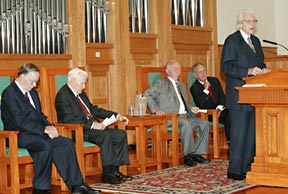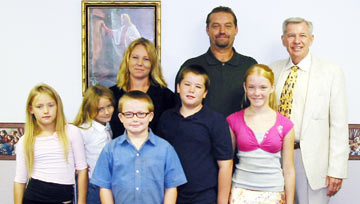Posted: 10/27/06
Texas Baptist Forum
All Saints’ Day
Halloween candy’s appearance on supermarket shelves usually coincides with the arrival of crisp autumn mornings, gaining an hour of sleep and an array of costumes. Halloween is an annual staple of our nation’s economy and a fixture on the calendar. Not all Christians embrace the custom, but its presence is nearly impossible to ignore.
Christians often ignore the day after Halloween—All Saints’ Day.
| • Jump to online-only letters below |
|
| Letters are welcomed. Send them to marvknox@baptiststandard.com; 250 words maximum. |

“Your love for our family has helped to provide the healing we so desperately need. Gifts you’ve given have touched our hearts in a way no words can describe. Your compassion has reached beyond our family, beyond our community, and is changing our world, and for this we sincerely thank you.”
Marie Roberts
Widow of Charles Roberts, who killed five girls in an Amish schoolhouse Oct. 2, in an open letter to Pennsylvania’s Amish community (RNS)
“I figured, you don’t take it with you.”
Donald Saltz
Philanthropist, who donated $5 million—one of the largest individual donations to a house of worship in the United States in years—to his synagogue in Washington, D.C. (Washington Post/RNS)
“The devil has long since concluded that he’s not really going to be able to defeat the Lord in open matters of conflict … so he infiltrates from the inside. Our people have been misfed and misled.”
William Shaw
President of the National Baptist Convention, USA, criticizing “prosperity gospel” (RNS)
|
While All Saints’ Day is not found on the secular calendar, it is an important date on the Christian calendar. For centuries, Christians have paused to celebrate, remember and learn from the exemplary lives of faithful saints and martyrs. Such cultivation of collective memory rewards the living with lessons from the dead. Giving a voice to those Christians who paved our way is an inextricable ingredient of the Christian tradition.
So, after Halloween, join Christians all over the world by pausing to honor those who have gone before. Your own congregation’s history likely includes stories of faith and ministry. An Internet search for Baptist names, such as Thomas Helwys, Adoniram Judson, Annie Armstrong or Barbara Jordan, will provide ample material. Examples from the broader Christian spectrum include Ignatius of Antioch, Catherine of Siena, Sebastian Castellio, Che Kam Kong or Oscar Romero.
All Saints’ Day is a reminder that a great cloud of witnesses accompanies those following Jesus. Their stories are our history; their lives our example.
John Essick
Waco
God & Islam
Those who deny Jesus as Lord do not worship the God of Abraham, Isaac and Jacob (Sept. 18). One cannot deny the deity of Christ and yet claim to worship the biblical God.
People who do not fully affirm Jesus as God in the flesh, crucified, dead and resurrected all fall into the same general category of idolators. They worship a god of their own creation but not the God who has revealed himself in Christ (Hebrews 1:1-3).
By the way, the answer to the Muslim issue is bold evangelism. No other position is acceptable for Christians. Why are we so timid to “live out” the truth, befriend, witness and seek the conversion of others?
Muslims are at our doorstep! Missions begins with your neighbor!
Ben Macklin
Fort Worth
Find common ground
Jews, Christians and Muslims share a common monotheistic heritage. Christianity is rooted in the Hebrew Scriptures. Islam, whose early proponents were surrounded by “people of the book,” honors many biblical prophets. If we insist that those who don’t accept the divinity of Jesus worship a different God, it will affect our relationships with not only Muslims, but Jews as well.
Whatever our convictions about the nature of God and how we all relate to him, our mandate is clear. If we love God who is perfectly revealed in Jesus Christ, we also will love our neighbors—all of them.
When we have opportunity to share our lives and our faith with Muslims in our communities and around the world, let’s follow the example of the Apostle Paul, who didn’t berate the Athenians for their poor theology but found a piece of common ground on which to build.
Diana Bridges
Starkville, Miss.
Prayer language
Jesus said a house divided fails. That seems to be the objective of the Pharisees within the Southern Baptist Convention and Southwestern Baptist Theological Seminary.
Dwight McKissic told students at Southwestern he has a prayer language (speaking in tongues), and now my alma mater has spoken out against him. I thought prayer was between the person praying and God, but I guess we now have to have our prayers approved by the Sanhedrin before we voice them to God. What a shame!
Instead of Baptists trying to bring unity among believers, we have no tolerance for “outside” interpretations. I once thought Southwestern Seminary was a great institution, but how the mighty have fallen. The Apostle Paul implores us to have tolerance for one another because there is “one body and one Spirit … one Lord, one faith, and one baptism” (Ephesians 4). The early church Acts grew rapidly because of unity in Christ; they didn’t emphasize their differences (Acts 2:44).
The seminary’s action is a symptom of the real problem—legalism. SBC leaders have allowed the legalistic leaven of the Pharisees to mix through the whole batch of dough. Jesus warned us to “beware of the leaven of the Pharisees and Sadducees.”
“But … when you pray, go into your inner room, close your door and pray to your Father who is in secret, and your Father who sees what is done in secret will reward you” (Matthew 6:6).
William Campbell
Port Aransas
Special Friends
Sometimes, the gentle surprises in life make us aware of God’s presence—the unexpected events that come our way. This was the case for me this fall. After gentle nudging, I agreed to help teach Bible study classes for a group of special-needs adults at Mount Lebanon Baptist Encampment.
I was impressed not only with the Special Friends Retreat, but also the wonderful “special” adults I befriended. The hugs and attention I received were overwhelming.
I have pondered what I experienced over the weekend, and now I understand better how God uses “simple things to confound the wise.” In some ways, we all are people who need a special touch. I saw Jesus with skin on at this retreat.
Praise be to God for the wonderful way the Baptist General Convention of Texas and the Mary Hill Davis Offering for Texas Missions touch lives!
Robert Whitfield
Dallas
Coffee with Don Miller
I appreciate your inclusion of articles like the one about Blue Like Jazz. I hope many of your readers will see the article and, as a result, read some of Donald Miller’s other books, particularly To Own a Dragon, and Searching for God Knows What.
I found myself wishing for the opportunity to converse at length with Miller over a cup of coffee, just to discuss some of his thoughts and expressions.
Dennis Coop
North Little Rock, Ark.
Allah and God: Similarities and differences
As one who lived among Muslim people for almost 30 years I learned both Christians and Muslims use the term “Allah” for God, but they have some similarities and some differences as to God’s nature.
Both believe that God/Allah is the Creator of the universe, that he controls it for his own purposes, that he will judge all people according to his own standards of justice and that those who please him will go to heaven; those who do not will go to hell.
Allah in Islam is distant and unknowable. In Christianity, God is both distant and close, knowable in Jesus Christ by the Holy Spirit.
Allah is just and righteous and judges people by their obedience to the Qur’an and the Hadiith (traditions), but no one can be sure of salvation. God is just and righteous, too, but also loving and kind and willing to suffer for the sake of his people’s salvation as he did in Jesus.
Allah is all-powerful, and he uses his power according to his will. God is all-powerful but uses his power to control history and for the benefit of mankind.
Allah’s will is ultimate and unchangeable. God’s will is also ultimate, but man’s choice can thwart God’s will.
Allah can be kind, but only if it moves forward the spread of his dominance. God is kind enough to forgive those who repent, even his enemies.
David King
Marshall
Allah and God not the same
In reference to the five pages devoted to the Islamic religion (Sept. 18), I hope your readers will realize that the Allah of the Quran and the Lord of the Bible are not the same.
The Bible tells us in Galations 1:8 “But even if we, or an angel from heaven, should preach to you a gospel contrary to what we have preached to you, he is to be accursed!” Joseph Smith, the founder of Mormonism, claimed he received a “new revelation” from an angel just like Mohammad. Smith said he received this new revelation on tablets of precious metal just like Mohammad. Smith established a “holy land” in Utah not unlike Mohammad establishing a “holy land” in Mecca. Smith said Jesus was “just a prophet” as do Muslims. Smith and Mohammad both instituted polygamy as part of their “restored religions.”
Bottom line: Any religious teaching that leads the follower contrary to the inspired Scriptures of the holy Bible dooms that follower to an eternal separation from God if they do not profess Jesus Christ as their Lord and Savior.
Lisa Preuss
Sulphur Springs
Will they never learn?
The message of the Old Testament is like a long series of sermons to the nation of people, Israel, hoping for a revival.
Only a few—the remnant—believed the Lord, and repented, and received the promised blessings of salvation through faith and obedience by having a personal relationship with the Lord God. The rest of Israel kept on having a religion without the relationship. They crucified the One who came as spiritual Messiah and Savior. They were destroyed because they rejected Jesus. The nation suffered horrors worse than the holocaust when they perished in 66-70 A.D. with the destruction of Israel, Jerusalem and the temple.
Will they never learn?
Ernest V., May Jr.
Livingston
Tithing and Malachi 3:10
Thank you for your editorial regarding the different positions on tithing (Oct. 16).
A lot of these tithing issues are a matter of faith. For example, should New Testatement believers tithe or not depends on one's faith.
I don’t debate matters of faith because I “avoid foolish controversies and genealogies and arguments and quarrels about the law, because these are unprofitable and useless.”
Many Christians get caught up in these debates about matters of faith. Nevertheless, what is going on in our churches in not a matter of faith; it is a matter of theft.
I do debate matters of theft.
The Bible teaches in Malachi 3:10 that God’s tithe was food, and we should honor his word because it also includes the fact that there was plenty of cash-currency available to have a cash-tithe if he had wanted it that way.
We have to ask ourselves: Why would someone remove the word “food” in Malachi 3:10 and add the word “currency”? The only answer I’ve been able to come up with is: For the love of money.
Amós Ortiz
Wilmington, Del.
Prayer language still a gift
As a Christian and a Southern Baptist pastor, there is no greater battle than the battle within to believe God’s word.
I was taught and believe that God’s word is totally without error. Yet I read every day where our SBC leaders show they do not believe God’s word. The latest is Paige Patterson and the trustees of Southwestern Baptist Theological Seminary, having passed a resolution condemning prayer language and other charismatic acts.
I would like to ask what they do with 1 Corinthians 14:39, “Wherefore, brethren, covet to prophesy, and forbid not to speak with tongues.” I do not knowingly speak with other tongues. However, I will not limit God. I see in Scripture where the Holy Spirit gave the gift of tongues to some believers, but I cannot find any place where he took the gift of tongues, nor any other spiritual gift, back.
If we believe the New Testament is the inspired, infallible word of God, how can we contradict it? How can we read into it things that are not there?
The same person who wrote Corinthians wrote much of the New Testament. If one part is incorrect, if one part is not true, then every word written is called into question.
The Bible is not a delicatessen. We cannot pick and choose what we want to believe and ignore the rest. The New Testament Pharisees did not recognize Jesus, nor his works, and neither do most of our SBC leadership.
Robert Pitts
Houston
Ban on tongues
Thank God Southwestern Baptist Theological Seminary trustees have finally banned the promotion of speaking in tongues!
I am sure it was about to get out of hand in that approximately one-third of the 100 million evangelicals in North America are already doing this. We should be sure to distance ourselves appropriately from these heathen masses and alienate them the best we can, as certainly we will not see them in heaven.
He who is not against us is most likely, in all probability, very much against us. I am certainly glad we have finally identified the enemy.
All I can say is I sure am glad this edict was not issued during the first century!
David Rosenthal
Lubbock
Seminary trustees' vote against prayer language
The vote by Southwestern Baptist Theological Seminary trustees regarding private “prayer language”—36-1 in favor of the seminary president’s recommendation—is an example of what is going on in “Southern Baptist” circles.
You don’t oppose the party line, or “bad things” happen to you.
Remember, though, that while these may huff and puff, they don’t really generate any wind that we don’t let them generate. The “management of Southern Baptists” is very consistent about either being in control or disassociating themselves from any persons or activity that they can’t control. There have been numerous examples of this in the past few years.
Perhaps Dwight McKissic believes discussion is not a bad thing and that refusal to allow discussion’and practice of biblical examples is a bad thing.
For those of you who can’t remember, this was a position that most Baptists held until a relatively few years ago.
This is also a really good way for McKissic to avoid being on any committees.
Bennett Willis
Lake Jackson
News of religion, faith, missions, Bible study and Christian ministry among Texas Baptist churches, in the BGCT, the Southern Baptist Convention ( SBC ) and around the world.




